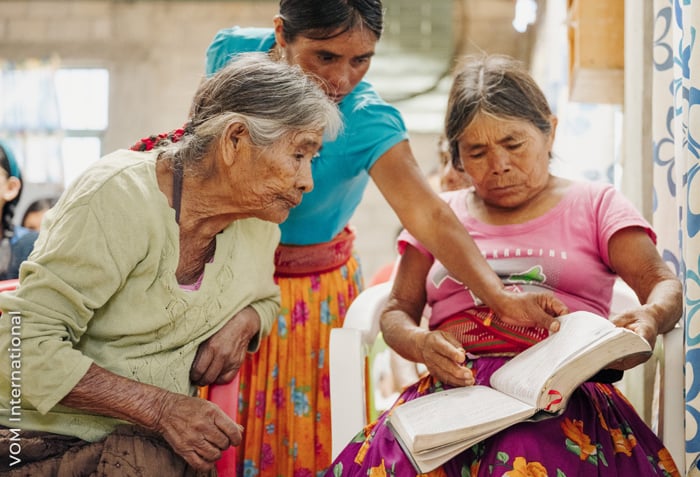
The Mission of VOMC
Part Two
"Actively Remembering and Serving the ‘Church Persecuted.”
In the previous month’s blog message, I described the “persecuted church” as a local congregation of Christians gathered in a particular place. These places can be found in countries or regions that are hostile towards the Gospel – to the extent that followers of Christ face severe forms of aggression and violence because of their faith. The ministry of VOMC exists to raise a voice on behalf of the persecuted believers residing in these volatile areas and to make an urgent appeal for Canadian followers of Jesus to not forget them. As our persecuted brothers and sisters are also an integral part of the body of Christ, we must be mindful to care for them through prayer and practical assistance.
While most people will understand this objective, VOMC’s leadership team has increasingly felt that the mission of serving persecuted Christians was to be carried out globally and not just at a local level. This vision is where the greater missional purpose of VOMC comes in, for we believe the revised wording, “church persecuted,” more accurately refers to the global body of Christ.
Too often, we have witnessed a tangible disconnect between Christians living in the Western world and those living in the persecuted world. In this context, far too frequently, Western Christians speak of the persecuted church as if it merely involves victims of opposition and violence. However, it’s crucial to understand that persecution isn’t only confined to specific global regions or denominational groups; it affects all who are faithfully following Christ. Therefore, VOMC is committed to emphasizing the church’s unity and strength, which testify of the Holy Spirit’s empowerment, rather than solely focussing on its obstacles.
In 2 Corinthians 12:26, the Apostle Paul provides a powerful message about Christian unity, emphasizing that our collective strength lies in the ability to support and uplift one another: “If one member suffers, all suffer together; if one member is honoured, all rejoice together” (ESV). Although Christians are separated geographically throughout the world, we are collectively all part of one vast global church. This is reflected in the Apostles’ Creed, 1 through which Christians declare their belief in the Holy Spirit, the holy catholic church, and the communion of saints. The historical definition of the Greek word “catholic,” literally means “universal,” pointing to the essential unity or wholeness of the church in Christ. Therefore, the creed confirms the wholeness of the entire church – spanning “across all time and places” – rather than a specific branch of Christianity.
Matthew 16:18 recounts Jesus’ prophetic words to His disciple, Simon Peter: “…I tell you, you are Peter, and on this rock I will build My church, and the gates of hell shall not prevail against it” (ESV). The late Dr. Knox Chamblin, a pastor and professor of theology, wrote: “In verse 18b, Jesus, not Peter, dominates the passage. It is He whom Peter confesses. It is He who utters the words of verses 17-19; whatever Simon is to be and do is the effect of Jesus’ authoritative declaration about him. The church belongs to Jesus, not to Peter. Jesus, not Peter, builds the church and protects it from destruction. Far from being a builder, Peter belongs to the building; he is Petros, the foundation stone in the edifice, a position he shares with other apostles (Ephesians 2:19-21; Revelation 21:14).” 2
It is evident that Jesus is still actively and powerfully at work around the world today through the ministry of His faithful church. However, it is a church constantly under attack by Satan, who seeks to destroy the body of Christ. It is from this reality that we refer to the “church persecuted.” With this in mind, here are a few core responsibilities that are essential to fostering true fellowship with persecuted believers:
- It entails a responsibility to advocate and care for members of the global body of believers who are suffering for righteousness’ sake. Pastor Richard Wurmbrand instructed us to provide persecuted Christians with a piece of bread (practical support) and the “Bread of Life” (referencing “Jesus”) through the distribution of Bibles and other Christian resources. This urgent need remains just as important today.
- It involves a responsibility to willingly embrace authentic discipleship, as demonstrated by our persecuted brothers and sisters in Christ. In fact, the testimonies of persecuted Christians can also teach us the way of Christ: how to love God and love our neighbours.
- It demands a responsibility to change how we think about persecution. As mentioned, persecution is an attempt by our defeated foe to silence and destroy the witness of God’s sacrificial love for His world, as revealed through the ministry of Jesus, His one and only Son. Despite the enemy’s opposition, the church ultimately remains triumphant because it follows our victorious Lord and Saviour. Sure, we may be prone to fear but, by God’s grace, it need not control us. Yes, we may need to endure suffering, but suffering is not the worst thing that can happen to a child of God; disobedience to the Father is. 3
The following stanza of the wonderful hymn, The Church’s One Foundation, should ignite your hope that better days are indeed ahead:
“Mid toil and tribulation
And tumult of her war,
She waits the consummation
Of peace forever more;
Till with the vision glorious
Her longing eyes are blest,
And the great Church victorious
Shall be the Church at rest.” 4
Oh, what a glorious day that will be! The church, once persecuted, will finally experience absolute freedom from this life’s trials and the promised fulfillment of perfection for her beloved Bridegroom. In that moment, all burdens will be lifted – replaced by the joy and unity that flows from God’s divine love and grace.
Keep praying for the “church persecuted.” Keep praying for the day of the Lord’s return. And keep looking up!
Grace and peace,
![]()
Floyd A. Brobbel
Chief Executive Officer
Voice of the Martyrs Canada Inc.
Endnotes:
1 For a complete reading of the Apostles’ Creed, go to: https://www.crcna.org/welcome/beliefs/creeds/apostles-creed.
2 J. Knox Chamblin, “Matthew,” Evangelical Commentary on the Bible, Vol. 3, Baker Reference Library (Grand Rapids, MI: Baker Book House, 1995), pg. 742.
3https://idop.org/web/wp-content/uploads/2016/09/IDOP-2016-Biblical-Theology-of-Persecution.pdf
4https://hymnary.org/text/the_churchs_one_foundation

